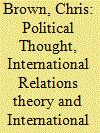|
|
|
Sort Order |
|
|
|
Items / Page
|
|
|
|
|
|
|
| Srl | Item |
| 1 |
ID:
171332


|
|
|
|
|
| Summary/Abstract |
Inspired by impossibility theorems of social choice theory, many democratic theorists have argued that aggregative forms of democracy cannot lend full democratic justification for the collective decisions reached. Hence, democratic theorists have turned their attention to deliberative democracy, according to which “outcomes are democratically legitimate if and only if they could be the object of a free and reasoned agreement among equals” (Cohen 1997a, 73). However, relatively little work has been done to offer a formal theory of democratic deliberation. This article helps fill that gap by offering a formal theory of three different modes of democratic deliberation: myopic discussion, constructive discussion, and debate. We show that myopic discussion suffers from indeterminacy of long run outcomes, while constructive discussion and debate are conclusive. Finally, unlike the other two modes of deliberation, debate is path independent and converges to a unique compromise position, irrespective of the initial status quo.
|
|
|
|
|
|
|
|
|
|
|
|
|
|
|
|
| 2 |
ID:
155785


|
|
|
|
|
| Summary/Abstract |
The relationship between political theory, including the history of political thought, and International Relations theory, including the history of international thought, has been, and to some extent remains, complex and troubled. On both sides of the Atlantic, the mid-twentieth century founders of International Relations as an academic discipline drew extensively on the canon of political thought, but approached the subject in an uncritical way, while political philosophers largely disdained the international as a focus. This changed in the 1970s and 1980s, with the emergence of the ‘justice industry’ based on critiques of Rawls’ A Theory of Justice and a consequent recovering of the past history of cosmopolitan and communitarian thought. A new discourse emerged in this period – International Political Theory – bridging the gap between political thought and international relations and stimulating a far more creative and scholarly approach to the history of international thought. However, in a social science environment dominated by the methods of economics, that is, formal theory and quantification, the new discourse of International Political Theory occupies a niche rather than existing at the centre of the discipline.
|
|
|
|
|
|
|
|
|
|
|
|
|
|
|
|
|
|
|
|
|